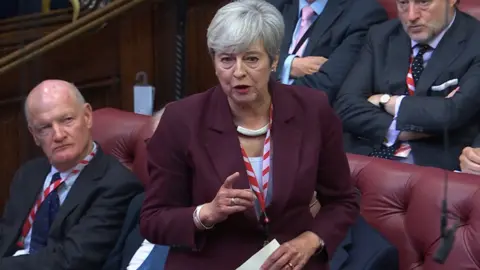
Jennifer McKiernanPolitical reporter
 UK Parliament
UK ParliamentA deal for a new select committee to scrutinise the assisted dying bill has been agreed by peers in the House of Lords, who are expected to allow the legislation to proceed.
Opponents, including former prime minister and now Baroness Theresa May, had warned the bill could introduce a “licence to kill” on the first of two days of debate, which started last week.
The new committee should be able to satisfy concerns raised by peers who disagree in principle with the Terminally Ill Adults (End of Life) Bill, said Baroness Glenys Thornton.
The Labour peer, the first of 95 expected to speak today, told colleagues MPs had backed the plans, and they should scrutinise rather than reject the bill.
The legislation proposes allowing terminally ill adults in England and Wales, who have fewer than six months to live, to apply for an assisted death, subject to approval by two doctors and a panel featuring a social worker, senior legal figure and psychiatrist.
There have been concerns among some of the Bill’s backers that peers against the proposed legislation would try to block it or “talk it out” so that it runs out of time to become law before next spring when this session of Parliament ends.
Lord Charlie Falconer, the Bill’s sponsor in the House of Lords, last week opposed an amendment from Baroness Luciana Berger for a special committee sitting until the end of the year, meaning the Bill’s progress was likely to be delayed until January.
Now the pair have written a joint letter to peers agreeing to a fast-tracked select commitee of about a a dozen peers, likely be formally launched next month and reporting to the Lords by November 7, before the Bill can progress to the next stage of the legislative process.
Lord Falconer, described the new amendment as a “constructive and sensible compromise”, adding that the Bill “now has time to go through all its stages in the Lords”.
In the joint letter to peers, Baroness Berger and Lord Falconer wrote: “It would be of benefit to this House for further evidence to be available before the process of detailed scrutiny begins at the (whole House) Committee stage of the Bill.
“We believe it is possible to call that evidence without causing a significant risk that the Bill would fail in this House through lack of time.”
The committee, known as a select committee, is expected to focus on how an assisted dying service would be funded, the potential impact on the health and justice systems and the role of coroners and various medical professionals in the process.
Urging compassion for the terminally ill who wanted to die, Baroness Thornton said: “Our job is to scrutinise [the bill] further and improve it if we need to – It is not our job to kill this bill.”
She added: “I reject the assumption that the sanctity of life requires terminally ill people to undergo a distressing and painful death against their will…
“The majority of the UK population supports this bill and there is a majority amongst Church of England congregations despite the Church’s leadership’s energetic lobbying against the bill.
“Please remember this is not about shortening life, it’s about shortening painful and distressing ways of dying.”
Conservative Lord John Deben claimed the bill had been “inadequately dealt with” by the Commons because it was a private members bill, and added it had also been “criticised seriously” by two Westminster select commitees.
“We are empowering the State to kill,” he warned, adding there would be a “temptation” for families to coerce dying relatives to take up assisted dying in order to pass on money and assets.
Assisted dying will become law in England and Wales only if both the House of Commons and House of Lords agree on the final wording of the Bill.
Friday afternoon is likely to see a motion to agree Second Reading at the end of the debate. That is not usually put to a vote in the Lords but it can be.
If it does pass into law, the Government has four years in which to get an assisted dying service into place, meaning it could be 2029/30 before the first assisted death takes place.








